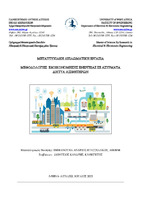Energy saving methodologies in wireless sensor networks
Μεθοδολογίες εξοικονόμησης ενέργειας σε ασύρματα δίκτυα αισθητήρων

Μεταπτυχιακή διπλωματική εργασία
Συγγραφέας
Ευαγγελάκος, Εμμανουήλ Ανδρέας
Ημερομηνία
2023-07Επιβλέπων
Kandris, DionisisΛέξεις-κλειδιά
WSN ; Wireless sensor networks ; Energy saving ; Energy efficient routing protocols ; LEACH protocol ; Energy sustainability ; Ασύρματα δίκτυα αισθητήρων ; Εξοικονόμηση ενέργειαςΠερίληψη
Energy efficiency is the major issue that arises in Wireless Sensor Networks (WSNs). Batteries that are typically the main power source of a WSN have a restricted lifetime. Hence, energy conservation in WSNs is a rather challenging task. Energy saving can be achieved through the implementation of appropriate techniques that aim to preserve the energy of sensor nodes for greater periods of time and minimize the amount of the consumed energy during nodes sensing, processing, and data transmitting tasks. This thesis aims to analytically examine all existing hardware-based and algorithm-based mechanisms of this kind. Among these mechanisms, energy efficient routing is one that could lead to energy sustainability of WSNs. Several energy efficient routing protocols have been proposed throughout the years, and LEACH protocol as one of the initially developed protocols for WSNs attracts the interest of many researchers, leading to the development of its successors. In this thesis, some modifications of LEACH protocol were developed and compared to it to evaluate their operation. In chapter 1, the architecture of WSNs, their applications and their types are described. Moreover, not only the causes of energy consumption in WSNs are explained but also all (i.e. 48) mechanisms that have been proposed in order to extend the lifetime of nodes in WSNs are analyzed. Chapter 2, explains the certain weaknesses, disadvantages and problems that are incorporated into the mechanisms for energy sustainability of WSNs, which obstruct their successful deployment and thus pose corresponding challenges. Chapter 3, focuses on the hierarchical routing techniques and presents one of the most significant protocols of this type, i.e. LEACH protocol, which is one of the initially developed protocols of this kind along with some of its descendant protocols. Chapter 4, constitutes the practical part of this thesis, in which simulations of different network deployment scenarios using the LEACH protocol have been conducted. Furthermore, three modifications are developed and compared to LEACH and LEACH-B protocols and their performance is evaluated. Finally, in Chapter 5, conclusions are drawn and future research challenges are discussed.

